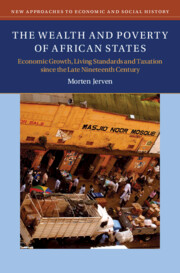 The Wealth and Poverty of African States
The Wealth and Poverty of African States Published online by Cambridge University Press: 06 January 2022
There is a long history of poverty in Africa. However, the most influential narrative of African poverty tells a story that takes place over a very short period of time. The history of Africa by numbers as told by the World Bank starts in the 1980s with the first Living Standards Measurement Surveys. The story is also a very narrow one. In general, there is a disconnect between the theoretical and historical underpinnings of how we understand and define poverty in Africa and how it has been quantified in practice. This chapter reviews how particular types of poverty knowledge have gained prominence and thus shaped the historical narrative of poverty in Africa. It summarizes recent work on living standards. New sources on real wages and evidence from anthropometric research allow perspectives on trends and relative levels in living standards back to the 1890s and until today. This raises the possibility that the narrative of African poverty that was born in the 1980s is a historical anomaly. Such a perspective may also offer a better perspective from which to reach a historical comparative verdict on the more recent “Africa rising” narrative.
To save this book to your Kindle, first ensure no-reply@cambridge.org is added to your Approved Personal Document E-mail List under your Personal Document Settings on the Manage Your Content and Devices page of your Amazon account. Then enter the ‘name’ part of your Kindle email address below. Find out more about saving to your Kindle.
Note you can select to save to either the @free.kindle.com or @kindle.com variations. ‘@free.kindle.com’ emails are free but can only be saved to your device when it is connected to wi-fi. ‘@kindle.com’ emails can be delivered even when you are not connected to wi-fi, but note that service fees apply.
Find out more about the Kindle Personal Document Service.
To save content items to your account, please confirm that you agree to abide by our usage policies. If this is the first time you use this feature, you will be asked to authorise Cambridge Core to connect with your account. Find out more about saving content to Dropbox.
To save content items to your account, please confirm that you agree to abide by our usage policies. If this is the first time you use this feature, you will be asked to authorise Cambridge Core to connect with your account. Find out more about saving content to Google Drive.